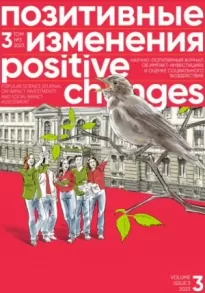Позитивные изменения. Том 3, № 3 (2023). Positive changes. Volume 3, Issue 3 (2023)

- Автор: Редакция журнала «Позитивные изменения»
- Жанр: Научная литература / Газеты и журналы
- Дата выхода: 2023
Читать книгу "Позитивные изменения. Том 3, № 3 (2023). Positive changes. Volume 3, Issue 3 (2023)"
GLOBAL FRAME
ENVIRONMENTAL AGENDA
It is impossible to contemplate a global perspective without considering the environment. Hence, one of the focal points in the trajectory of Korean higher education, within the realm of universities’ third mission, is the environmental agenda.
For instance, Korea University has embarked on a formidable mission: by 2030, it aims to slash carbon emissions by 40 %, primarily through the adoption of alternative energy sources. By 2045, the university envisions achieving carbon neutrality across all its campuses and affiliated entities.
Meanwhile, Youngsan University, located in the city of Yangsan, also has long-term plans, aligning with sustainable development objectives. Research endeavors span Arctic logistics, climate change, environmental preservation, and the cultivation of an inclusive society.
South Korean universities are making significant strides toward greener campuses and the efficient management of recyclable resources.
HUMAN VALUES
In the dawn of the impending fourth industrial revolution, safeguarding human values assumes paramount significance. Korean universities’ leadership is acutely cognizant of this imperative. Hence, one of the core competencies cultivated in young professionals is the ability to maintain their humanity amidst the burgeoning realm of high technology. This competency blossoms through the nurturing of mutual respect, the embodiment of societal values, collaborative creativity, and an unwavering commitment, not only to self-development but also to the betterment of society, to which each of us belongs.
Gangneung-Wonju National University spearheads this endeavor and straightforwardly articulates it within its institutional development vision: “We cultivate morally astute, highly skilled individuals through a creative approach to academic and scientific challenges. Our objective is to instill in our students a profound respect for humanity.”
At Hankuk University of Foreign Studies, these humanistic ideals find expression through the formulation of “global citizen consciousness.” Recognizing one’s global identity invariably leads to an expanded sense of responsibility among students — not only for their personal lives and families but also for their nation and the entire world. The global realm is no longer an elusive concept, thanks to the advent of digital technologies. Yet, bridging the gap to true globality on a human level requires starting from the grassroots. Nearly all universities ardently engage with their local communities, organizing open days, fairs, festivals, and other outreach initiatives that foster collaboration with the residents of the neighborhoods in which they are situated.
Korea University’s Campus City program epitomizes this ethos, allowing local residents to actively partake in university life while positioning the university as a genuine community actor on a municipal scale. Similarly, the leadership of Youngsan University firmly believes that forging academic partnerships with Russia will not only propel the advancement of higher education but also drive the realization of an inclusive society on an international stage. The emphasis lies particularly on joint research ventures and educational programs.
In conclusion, reflecting on the meeting of university rectors from both Russia and Korea, it’s evident that despite the difficult political and economic landscape, the dialogue persevered. This augurs well for the prospects of continued constructive discourse and underscores the exceptional human competencies exhibited by university leadership — competencies that are of paramount importance in nurturing the students of today.
Кейс выпуска / The Case of the Issue





